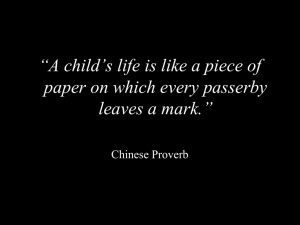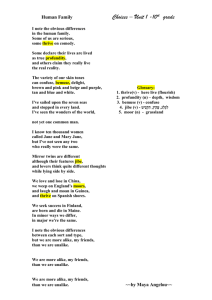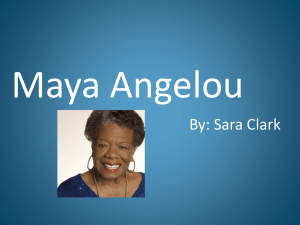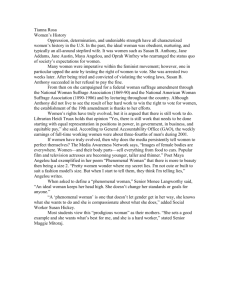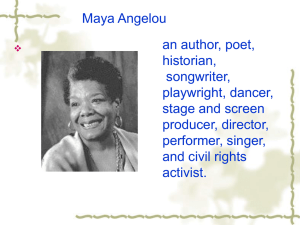- The Criterion
advertisement
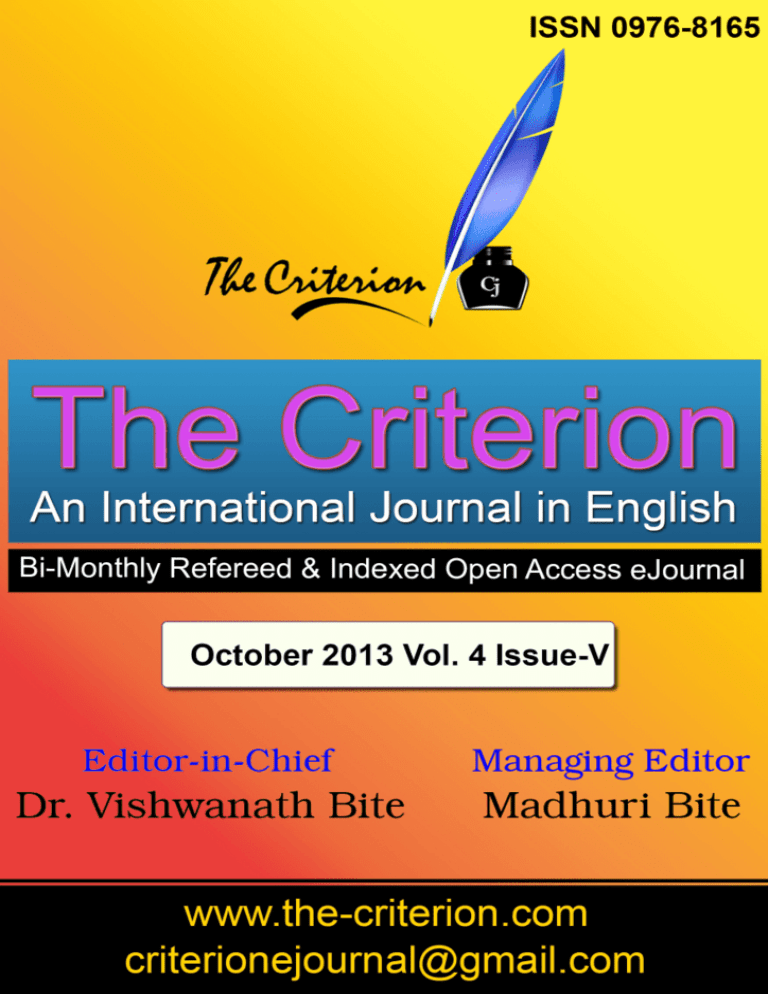
www.the-criterion.com The Criterion: An International Journal in English ISSN 0976-8165 Melody of Sanguineness in the Poetry of Maya Angelou Deepika Rani Research Scholar, JJT University, Jhunjhunu, Rajasthan Hailed as a global renaissance woman, Maya Angelou is also known for her multi talented personality. She is a world acclaimed poet as well as an autobiographer. An Afro-American by birth, she underwent many traumatic incidents in her life. These incidents make her braver instead of making her timid. Even the two big monsters, one is slavery and the other is racism, fails to break Maya’s inherent positivism. She reflects the bitter realities of slavery and racism in her poems. Her poems are full of optimism. She has a hope of good future of her race. Maya assures Afro-Americans of prosperous future through her poems. She becomes a Godsend for her race. Maya Angelou is a poet, novelist, educator, producer, actress, dancer and civil rights activist. She is the representative of African- American who had been victimized of the harsh and cruel treatment of slavery and racism. Her poems are the voice of her race. She is a person who believes in humanity. Her poems are full of optimism. Her poems become the source of encouragement for all. She is an Afro-American Poet who is famous for her autobiographies and collections of poetry. Her poems have been published in various collections. Some of them are “Just Give Me A Cool Drink Of Water ‘Fore I Diie, Oh Pray My Wings Are Gonna Fit Me Well, Still I Rise, I Shall Not Be Moved. Her autobiography published in six volumes with various names: “I Know Why The Caged Birds Sings, Gather Together In My Name, Singin’ and Swingin’ and Getting’ Merry Like Christmas, The Heart Of A Woman, All God’s Children Need Travelling Shoes, A Song Flung Up To Heaven.” These autobiographies are a record of life of Maya that she lives. Maya has been a victim of rape at her tender age of eight. She was molested by her mother’s boyfriend, Mr. Freeman. This incident changes her life. When this rape was known to her family, she comes to hear news, ‘that Mr. Freeman was killed.” After this incident Maya conceals herself in a colorless cocoon. She becomes silent. It was Mrs. Flower who makes this little girl speak. She encourages Maya to speak by telling her importance of language. Her words bring a new dawn in Maya’s life. Then the words, in the form of literature become Maya’s main strength. The strength that makes her popular not only in her own country but in the whole world also. Now it is because of the literature that she becomes a world famous personality. It also helps her to understand both herself and the world around her. The scene of rape was an unforgetful memory in life of Maya. She still knows the pain. She shares her views on this unfavorable and disgusting vice in her poem “Men”: One day they hold you in the Palms of their hands, gentle, as if you Were the last raw egg in the world. Then They tighten up…. Vol. IV. Issue V (October 2013) 1 Editor-In-Chief: Dr. Vishwanath Bite Bi-Monthly refereed and Indexed Open Access eJournal www.the-criterion.com The Criterion: An International Journal in English ISSN 0976-8165 She wants to alert the other women about the physical hunger of male (rape) and wants to save her fellows from this monster. The childhood of Maya was not good. She was not paid much attention by her parents. Her upbringing was not up to the mark. It was because of differences between her mother and her father. Thus Maya has experienced a lot of negative things in her life, the great depression, her parents’ death, rape, racism and her becoming as an unwedded mother at age of sixteen and bad marriages. All the negative things that she went through in her life give her pain. But this pain makes her stronger to deal with tougher situations. It is one of the qualities of her poems that she reflects in many of her poems. Although her childhood was a crucial one, Maya was not paid much attention by her parents. She loves her family very much. But it is her optimistic nature that she declares that her parents are the best parents. She says that her father is the best father and her mother is the best cook. Her poem “Little Girl Speakings” describes her feeling very well about her family: Ain’t nobody better‘s my Daddy ……..further she says about her mother’s cooking that No lady cookinger than my Mommy smell that pie, see I don’t lie no lady cookinger than my Mommy. The idea of praise of her parents continues in the poem “Avec Merci, Mother”. All the living human beings love their mothers. It is common to all. The same is with Maya. She loves her mother very much. Maya praises her mother in this poem. She has the views of that her mother was a polite and adored lady. From her penny of beauty Posing lofty, ……. She praises all who kneel and whispers softly, ….. a solitary figure Hold her eyes. Maya Angelou is six feet tall. She is very bold and determined lady. She confesses that she is not as beautiful as other woman is. Sometimes she gets disturb by her appearance but this disturbance is of short duration. Later she takes her appearance in a different way. Dr. Usha comments on it, “The Female identity crisis is centered around her appearance. In a society attuned to White standards of physical beauty, Angelou felt plain and ugly and therefore inadequate. This threw her into a psychological prison from which she freed herself with great difficulty. Running parallel to the identity crises is the theme of displacement both personal and social. Stamps, Arkansas did not offer a sense of place to Angelou. Against this personal displacement is set the social reality of racial subordination and impotence. Her grandmother’s arms mitigated at least some of the loneliness she felt. When she moved to St. Louis, her mother's world of taverns, pool halls, gambling and fast living, she felt like a stranger, unable to find any emotional security.” 1 Vol. IV. Issue V (October 2013) 2 Editor-In-Chief: Dr. Vishwanath Bite Bi-Monthly refereed and Indexed Open Access eJournal www.the-criterion.com The Criterion: An International Journal in English ISSN 0976-8165 She accepts her biological appearance as not deserving for a fashion model’s size. But she also accepts her characteristics that she has. She is a great optimist. In a very familiar poem “The Phenomenal Woman” Maya says about her physical appearance: Pretty women wonder where my secret lies. I’m not cute or built to suit a fashion model’s size But when I start to tell them, They think I’m telling lies. Maya Angelou prouds to be a black. It is the belief of fair complexion women that their complexion is the only thing which makes a woman beautiful. In their views, a black colored woman is inferior to them only because of her dark complexion. They totally neglect the virtues that make a person beautiful. But this criterion of beauty is not acceptable to Maya Angelou. She is a bold lady. So, firstly she accepts her physical appearance is not like a model but Later in the same poem she radically accepts her physical gestures are no less than the white woman. Maya has the views of real beauty is the inner beauty not the physical one. Thus she values inner beauty. She talks about entire body of this woman from hairs to heals. In the last stanza she discloses what is different in her from other woman by saying: That’s me Now you understand Just why my head’s not bowed. The basic idea is the inner beauty as well as pride of not bowing in front of anyone. Maya is a woman of strong determination. Maya was called “Mary” instead of her original name “Margaret”. This crime was done by a white Mrs. Viola Cullinan, master of the house where Maya worked as a maid. This is not a single incident when Maya has been a victim of racial insult. She as well as other Afro-American suffered a lot due to racism and slavery. Although the Civil War ended the black slavery but still Whites used to have contempt for the Blacks. They are not accepted in churches, buses and hospitals. The same experience of racial insult is recorded in her autobiography “I Know Why The Caged Birds Sings”. When a dentist denied to treat her tooth pain, claiming he would “rather stick his hand in a dog’s mouth than a nigger”.2 Nigger was a word of insult for Blacks. The name of a person is his identity. It is that noun by which he or she is called by others. But if someone calls a person by another word instead of his name, it hurts his feelings. It is a natural phenomenon. In America Blacks were insulted by calling of a word “nigger” instead of calling by their names. Whites call Blacks "nigger” and it was intolerable to them. It was an abuse to blacks. The question "Who on earth needs a lazy nigger?" spoke by a white bigot and given a certain veracity by institutional scaffolding, becomes internalized. The oppressed person begins to wonder if he, indeed, may be that thing that his oppressors say he is. In Angelou’s poem “The Calling Of Names”: He went to being called a colored man After answering to “hey nigger”. Maya is in the same row of poets who write about the persons related to their life. She pays her homage in the form of poems to the persons who had suffered a lot due to slavery. There was a lot of discrimination between blacks and whites in America. Blacks Vol. IV. Issue V (October 2013) 3 Editor-In-Chief: Dr. Vishwanath Bite Bi-Monthly refereed and Indexed Open Access eJournal www.the-criterion.com The Criterion: An International Journal in English ISSN 0976-8165 were treated as slaves and their lives were worse than a beast. The same idea lies in Addison Gayle, Jr. quotes Hinton Helper’s statement about Black and White as: “Black: A Thing of Ugliness, Disease”… “White: A Thing of Life, Health, and Beauty.” 3 But Maya who is an idol of optimism takes her race as a good one. She doesn’t accept their wrong concept of Africans. As a true soldier of her race, she replies to whites in the form of her poems. Her poem “Passing Time” is a great slap on the thinking of The Whites who assumes themselves superior because of white complexion. Maya compares a fair- skinned person to a dark-skinned person. Her optimism for her colour as well as her race can be seen with her following thoughts: Your skin like dawn Mine like dusk. One paints the beginning Of a certain end. The other, the end of a sure beginning. Optimism is filled in nerves of Maya Angelou. Her poems are a good source of encouragement for anyone. Her poems were liked by all and still they are the choice of readers. Lyman.B.Hagen says, “Although few critics have found great merit in her poetry, Angelou has acquired a dedicated audience. Her work seems to have a special appeal to college students. At her public readings, a generally balanced cross-section, male and female, black and white, are in attendance. Some admirers of her poetry have been so impressed with its rhymes, rhythms, and content that they themselves have been encouraged to write”. 4 There were several restricted areas for Blacks where they were not allowed to go such as Parks, White church and public amusement places. Maya hopes to end the discrimination against black people one day. In the poem "Million Man March Poem” she says: The night has been long, The wound has been deep, The pit has been dark, And the walls have been steep. The same idea of a strong hope reminds the lines of the poem “The Last Ride Together” by Robert Browning. In which after denying of beloved, the poet has a strong hope. And thus after being rejected by his beloved the poet requests her for a ride. A ride which is Vol. IV. Issue V (October 2013) 4 Editor-In-Chief: Dr. Vishwanath Bite Bi-Monthly refereed and Indexed Open Access eJournal www.the-criterion.com The Criterion: An International Journal in English ISSN 0976-8165 his last ride with her but it was his hope that his beloved accepts his request and he feels it blissful. My last thought was at least not vain: I and my mistress, side by side Shall be together, breath and ride, So, one day more am I defied. Who knows but the world may end to-night? 5 The hope of good life in future is the backbone of Maya Angelou’s poetry. She is a sanguine who believes that the problems and hardships of the life make a person stronger than before. Further Maya says in the ‘Million Man March’ Poem: The hells we have lived through and live through still, Have sharpened our senses and toughened our will. Maya with her brother Bailey was sent to her maternal grandmother in Stamps when her parents got divorced. Grandmothers have been a significant figure not only in Maya’s life but in all the Black families. Maya calls her grandmother Annie Henderson “Momma”. Momma was her paternal grandmother. But it was her maternal granny to whom she was emotionally attached. Momma told stories to Maya. She told her about the harshness of slavery and the stories of Africans who were brought to United States. She was a lady who lived her life by the Bible. These stories become strength that Maya will carry throughout her life. Angelou gives a vivid picture of her grandmother who was a lady of strong will. She has faced all the humiliations but faced them with dignity. Angelou`s Momma was a determined lady. She lived her life with dignity. But due to racism she had to face many problems for the upbringing of her children. There were some situations when she felt that she was bounded to tackle with them. In poem ‘I Shall not be moved’ Maya records her grandmother’s sayings: “I have certain way of being in this world, and I shall not, I shall not be moved”. Talking about Angelou’s poem “I know Why The Caged Bird Sings”, it seems the poem on slavery of Afro-American. But if we give a close reading to the poem, we will find that this poem is related to all persons who are subordinated, who has lost their selves due to any reason either it is slavery or patriarchy. Blacks both male and female were enslaved by Whites but the Black female is the double colonized, one because of slavery and other because of her husband. Black males felt that in order to be total and free and independent and powerful, they had to be like white men to their women. So there was a terrible time when black men told their women that if you really love me, you must walk three steps behind me. Thus even after getting freedom from slavery, the condition of Black women was very bad. Just like a bird in a cage who wants to fly in freedom but her feet are tied: But a bird that stalks down his narrow cage can seldom see through his bars of rage Vol. IV. Issue V (October 2013) 5 Editor-In-Chief: Dr. Vishwanath Bite Bi-Monthly refereed and Indexed Open Access eJournal www.the-criterion.com The Criterion: An International Journal in English ISSN 0976-8165 his wings are clipped and his feet are tied so he opens his throat to sing. Thus the hope of good future of black females is also a gem of Angelou’s poetry. A series of her poetry established Maya Angelou's fame as a writer. She differed from the other Black women writers in her approach. Protest and social commentary run through Angelou's poems. Her poems carry a core of resistance to emotional and physical oppression and a will to discover a path of survival. Her poems are different from other poets. She deals with the subjects related to her life. Even small incidents of her life become a part of her poetry. Maya becomes an unwed mother at an early age of sixteen. She wants to be a good mother. Thus she does various types of jobs to earn bread and butter for her son and herself. She joined club houses as a professional dancer in Purple Onion Club with the name Marguerite Johnson and left the club with a new name ‘Maya Angelou’. Maya gives her autobiographical details of hardships of life. She tells her financial conditions. She has the views that it is very hard to keep three children in school and to fulfill their demands. But she did her duty of a mother very well. Maya gives details of her being as a good mother in “Me and My Work” ….give them enough of the things they want and keep them out of the street. They’ve always been good. She is a lady who has a plenty of optimism in her views. She confesses that it was not only her story but it was story of almost all blacks. She takes herself far better than others. Says she: My story ain’t news and it ain’t all sad, There’s plenty worse off than me… This positive attitude and optimism is a gift to her, given by her grandmother. Maya feels proud to be a black. She celebrates Black culture in many of her poems. Regarding her journey in her works that tells history, Lupton M.J. rightly remarks: “Angelou’s journey from Africa back to America is in certain ways a restatement of the historical phase known as the mid-passage…Angelou shares a deep identification with the victims of mid-passage. Remnants of that journey burn in her memory, shaping her identity with her ancestors and the structure of autobiography itself.”6 In another poem “Ain’t That Bad” she defends her race and culture. The word ‘Bad’ is used in poem many times. It is used in a positive sense, emphasizing the culture of the people. Maya is of the views that their culture is unique. It includes their language, food and music and living criteria. Maya says: Dressing in purple and pinks and greens Exotic as rum and Cokes Vol. IV. Issue V (October 2013) 6 Editor-In-Chief: Dr. Vishwanath Bite Bi-Monthly refereed and Indexed Open Access eJournal www.the-criterion.com The Criterion: An International Journal in English ISSN 0976-8165 Living our lives with flash and style Ain’t we colorful folks? Now ain’t we bad? An’ ain’t we Black? Angelou celebrates her culture. She never felt ashamed to be a Black. Rather she feels pride in it. She believes in humanity. She doesn’t believe in colour, caste, race, subordination etc. Dr.Usha Kalyani comments on the same pride: “To some ‘Black’ gives a sense of shame, self-denigration and self-hatred. To Angelou, it is a source of pride, though initially it was self-limiting. Her vision of nurturing family and cohesive community has strengthened her. Some measure of stability which graces her life is based on mutual need, reciprocal respect and shared compassion which oppression encouraged in the Blacks. Through honest portraiture and exemplary gift of language she brings alive her struggles to maintain her personhood.”7. Literature is the mirror of our lives. Maya Angelou uses literature as an exercise in exorcism of trauma to prevent further repetitions. She feels that writing poems and prose is a way through the problems. Her life-affirming, indomitable spirit makes her emphatically articulate in her poem “And Still I Rise”: You may write me down in history With your bitter, twisted lies You may trod me in the very dirt, but Still, like dust, I’ll rise ……… Just like the hopes, springing high, still I rise. Thus with this great poem, Maya Angelou explains her wishes and hope for the good in future. Whatever will happen, the woman must rise, rise and rise. Maya Angelou throws light on her life, through the poems and her autobiographies. She writes about the social, political, personal matters of the era in which she exists and even about the history of Blacks also. She with the help of her poems realizes a reader the pain of racism, slavery and exploitation. God made the man as man but the man makes other man his slave. Her poems acquaint us to her life, slavery system, her various jobs including prostitution, singer, dancer and many more. Angelou is a great poet who not only talks about identity of a woman but talks about the identity of Black. “The Slogan of Black American Women's Literature is personal is communal' and 'communal is personal'. The genre of Autobiography best reflects this psyche of the black American woman and hence to justify the hypothesis the works of three representative black American women autobiographers, Harriet Jacobs, Zora Neale Hurston and Maya Angelou, have been Vol. IV. Issue V (October 2013) 7 Editor-In-Chief: Dr. Vishwanath Bite Bi-Monthly refereed and Indexed Open Access eJournal www.the-criterion.com The Criterion: An International Journal in English ISSN 0976-8165 chosen. They represent crucial and formative years in validating the authority of an authentic black community, trace the development of the self identity of black woman as a distinct individual. The identity of the community is realized through the individual consciousness.”8 Maya Angelou prouds to be a Black. She says of her culture is that it is not bad. She in her poem, “Ain’t That Bad” repetition of the title line shows that Angelou wants to stress on her idea: An ain’t they Black? An ain’t they Black? An ain’t they Bad? An ain’t they Bad? An ain’t they Black? An ain’t they fine? Maya Angelou is a great poet, a poet of her race, a poet of humanity and a poet of optimism. Her positivism about her race’s welfare is incomparable. Maya Angelou is a strong determined lady who becomes an unwed mother at an age of sixteen. She earns her own livelihood. She encounters many problems. She joins various types of jobs to earn Bread and Butter for her son and herself. She lives her life boldly. As an Afro-American woman it is very hard to live and survive alone in the era of postcolonial. Postcolonial, the name clarifies that colonial rule was over. But still its effect exists. Racism takes its place. Blacks had suffered due to their complexion. And in such type of society where racism exists, it becomes very difficult for a woman to survive. Patterson comments on the same: “ The 'double burden' suffered by Black Women has worked to their advantage, "whereas the burdens of poor African-American men have always been oppressive, dispiriting, demoralizing and soul-killing, those of women have always been, at least partly generative, empowering and humanizing".9 Slaves were treated as the personal property of their masters. The Blacks were oppressed to do hard work. They were treated badly by the Whites. The slaves have to do a lot of work .but what they paid was nothing. Still they were not given the proper meals to eat. The slaves were sold as they were not human but as they were articles. The slaves had to bear the physical punishment given by their masters. These people were not only hurt physically but they were also tortured mentally. Maya Angelou in her poem “When I Think About Myself” says: My folks can make me split my side, I laughed so hard I nearly died, The tales they tell, sound just like dying, They grow the fruit, But eat the rind, Vol. IV. Issue V (October 2013) 8 Editor-In-Chief: Dr. Vishwanath Bite Bi-Monthly refereed and Indexed Open Access eJournal www.the-criterion.com The Criterion: An International Journal in English ISSN 0976-8165 I laugh untill I start to crying, Maya Angelou paints a crystal clear picture of the hard and problematic life of her race. She, through her poems conveys the living criteria of blacks under colonial rule of whites. She is the Godsend for the black people. Angelou stresses on her race’s identity by her poems. She is a poet not of her own but of her race also. Her poems deal with the identity of female as well as identity of Afro-American people who were colonized by Americans. After colonization they had been the victim of racism. Thus their identity was not established even as a human being. They were treated first as slaves then as Blacks. The identity of Afro-American woman was totally different from Afro-American males. Afro-American woman was double-colonized, one because of slavery, other because of Black male. They crave for their identity, that identity which is their own, not given by cultural phenomenon. After doing household works, these women also work outside for their survival. They sacrificed their children’s upbringing, as they were helpless to nourish their master’s children. Black males were forced to handover their women to white males to satisfy their carnal hunger. This pathetic condition of female as well as black male is described clearly by Maya Angelou in her poems. While facing such cruel social problems of slavery and racism, she still has hoped that she will rise. The same hope of rad future, she has for her race too. Through her poems, she put a new life in the almost deadly figures of Afro-Americans as slaves. Her sanguine poetry becomes strength of Afro-Americans. In real sense Maya Angelou is a leader of blacks, who made aware her race about their power as black woman is known as the synonym of strength. Her poems are a treasure of optimism. She writes about the good forthcoming future of blacks. The same hope of bright future is ther theme in her poem “The Pusher”. What a great sanguine poet Maya Angelou is who not only hopes but she strongly declares also that: “BLACK IS!” “NATION TIME!” “TOMORROW’S GLORY HERE TODAY”. Works Cited: 1 Kalyani, Dr.(Mrs.) Usha. Black Autobiography: Maya Angelou Tells Her Tale, Critical Essays on American Literature. New Delhi: Sarup & Sons.rep.2008.190.Print. 2 Angelou, Maya.I Know Why The Caged Bird Sings. New York: Bantom Books.1971.160. Print. 3 Addison Gayle, Jr.” Cultural Strangulation: Black Literature and the White Aesthetic” in The Black Aesthetic edited by himself. Garden City: N.Y. Doubleday and Co. Inc., 1971.44.Print. 4 B.Hagen.Lyman.Poetry : Something About Everything. Heart of a Woman, Mind of a Writer, and Soul of a Poet : A Critical Analysis of the Writings of Maya Angelou.University Press Of America.1997. 118-136.Print. Vol. IV. Issue V (October 2013) 9 Editor-In-Chief: Dr. Vishwanath Bite Bi-Monthly refereed and Indexed Open Access eJournal www.the-criterion.com The Criterion: An International Journal in English ISSN 0976-8165 5 Browning, Robert. My Last Duchess and Other Poems. U.S.A : Dover Publications, 1993.69.Print 6 Lupton, Mary Jane. Maya Angelou: A Critical Companion, Westport, Connecticut: Greenwood Press, 1998. 163. Print. 7 Kalyani. Dr.Usha. Black Autobiography: Maya Angelou Tells her Tale. Critical Essays on American Literature. Ed . Dr. K.Balachandran. New Delhi: Sarup & Sons. reprint 2008.196.Print 8 Chellajothi, D.Laura Dameris. Journey as Metaphor in Black American Women’s Autobiography. Critical Essays on American Literature. New Delhi: Sarup & Sons.rep.2008.213.Print 9 Patterson, Lindsay. Black Theater: A Twentieth Century Collection of the Work of its Best Playwrights. New York: New American Library, 1971. 11.Print. Vol. IV. Issue V (October 2013) 10 Editor-In-Chief: Dr. Vishwanath Bite Bi-Monthly refereed and Indexed Open Access eJournal

